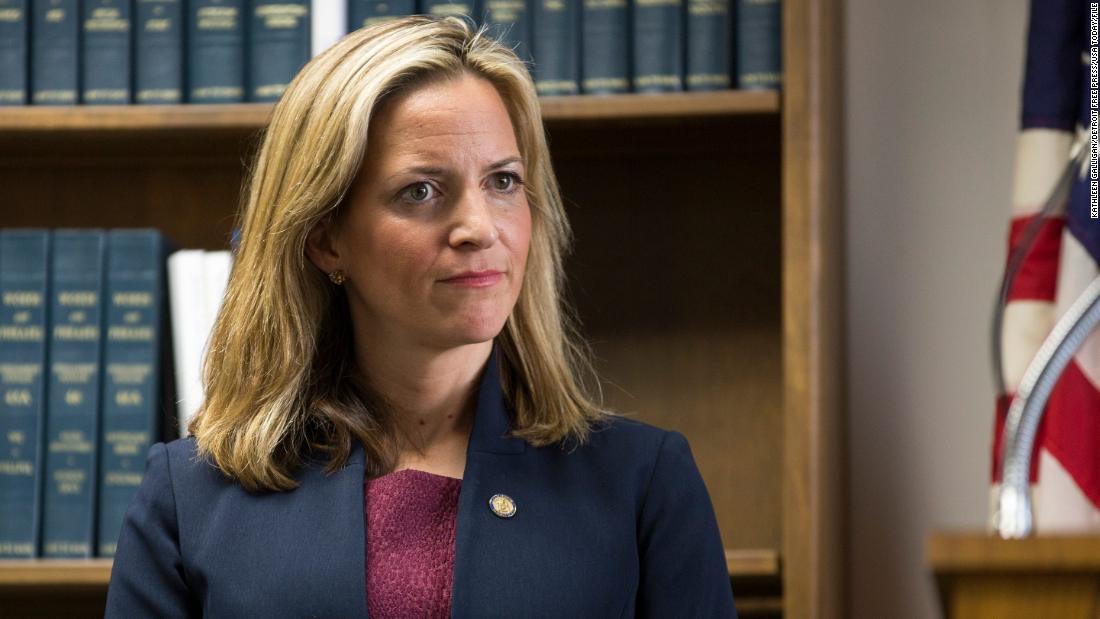
Election deniers have won Republican primaries across the country — including in states that will be central to the 2024 presidential election.
To some Democrats, however, the party hierarchy has not fully grasped the threat of what election-denying candidates would mean as their state’s top election officials.
“There has been improvement. Do I think it is enough? No,” said Ellen Kurz, founder and president of iVote, a Democratic outside group focused on secretary of state races. “If I was running the (Democratic National Committee), I would make this the top priority. It’s a no-brainer for me.”
‘A seismic shift’ for secretary of state races
In several states, the secretary of state is appointed by the governor, but the position is an elected office in a majority of states, albeit one that voters haven’t usually prioritized. Both Republican and Democratic campaigns raised tiny sums compared with other statewide counterparts, and few aired ads on television.
An insurrection makes a difference. The aftermath of the 2020 election forced more Americans to recognize that our country is at a crossroads and our democracy is in peril,” said Kim Rogers, executive director of the Democratic secretary of state group, noting that Trump’s pressure campaign on state officials after his loss and the global pandemic have also contributed to the attention. “I think across the board, all of those factors culminated in people recognizing that secretaries of state are one of our last lines of defense. And people are paying attention now.”
She added: “As a collective, 2020 really was a seismic shift in the focus on these races.”
And in some races, Democratic candidates for secretary of state have raised up to five times what they had collected in earlier elections.
For top law enforcement officials in these states, the outcome of these races could be significant.
“I know firsthand what it would be like to have someone in the office such as Mr. Marchant. It’s not lost on me at all,” Ford said, referencing the litigation after the 2020 election. If he were to win and worked to dispute the 2024 election, Ford added, “I could envision a scenario where that constitutional officer would be sued by my office. It is incumbent on me, the attorney general, to defend the Constitution of the United States and the state of Nevada … especially when it relates to something as important as elections.”
Ford is running for a second term this year. Marchant did not respond to CNN’s request for comment.
More could be done
Even as money flows into these races, the total spending in these contests remain small, especially compared with races for governor and Congress, and there are concerns that national Democrats aren’t doing enough.
“The reality of an election cycle is everyone is trying to focus on their level of the ballot,” said a Democratic operative working on secretary of state races. While the operative acknowledged there has been a bump in attention on these contests as Democrats make the case that “democracy is on the ballot,” more could be done.
“We welcome any additional support,” the operative said.
Asked about their involvement in secretary of state races, a Democratic National Committee official did not detail any direct involvement but said the party “has been investing earlier and more robustly in the DASS battlegrounds, making direct investments in the coordinated campaigns and state parties that support Democratic candidates up and down the ballot in these targeted states.”
The official noted that in Arizona, Nevada, Michigan and Georgia — four of the Democratic secretary of state association’s top targets — the party has invested $11 million. The committee also transfers $12,500 to each state party every month to help with all campaigns, including down-ballot races.
Advocates for secretary of state races argue, however, that the impact of more money could be significant. While secretary of state contests have grown more expensive — and many of the candidates are competing for crowded air time in states with other top-flight statewide races — their cost still pales in comparison to other contests, allowing a little money to go a long way.
That’s a lesson iVote, the Democratic group that exclusively focuses on secretary of state races in swing states, has learned since its founding in 2014. Its budget then was $4.5 million, a number that grew to $7.5 million in the 2018 cycle. For the 2022 cycle, the group plans to spend $15 million, double its spending from four years ago.
“There are these small races, down-ballot races that are going relatively unnoticed that will determine if we have a free and fair election,” said Hari Sevugan, a senior adviser to iVote. “Because pro-democracy candidates won these seats in 2018, our democracy survived in 2020. Who wins these seats in 2022 will not only determine what the election looks like in 2024, but what our democracy looks like the day after.”
Kurz, who has been involved in secretary of state races for years, echoed that sentiment, arguing that Democrats cannot ignore what some Republican nominees are saying they will do if they win.
“Let’s just say one of these people win, and they refuse to certify the votes because they don’t like the results,” Kurz said. “It’s a constitutional crisis if the election is close, as it usually is. So, how could there be anything more important than making sure that we get pro-voting advocates of free and fair elections into these offices?”
“What’s more important than that?” she added.
